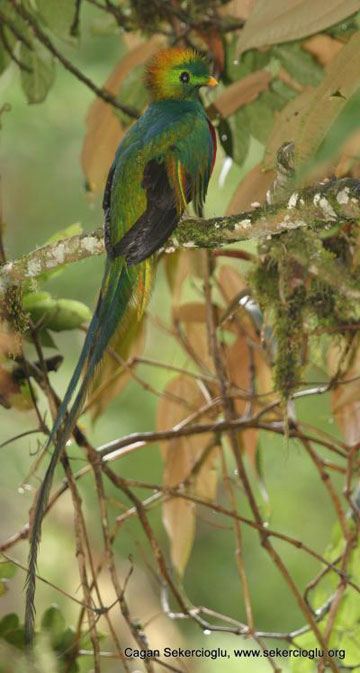mongabay.com
February 21, 2012
There may be less birds for birders to see in the world as the planet warms. Climate change, in combination with deforestation, could send between 100 and 2,500 tropical birds to extinction before the end of century, according to new research published inBiological Conservation. The wide range depends on the extent of climate and how much habitat is lost, but researchers say the most likely range of extinctions is between 600 and 900 species, meaning about 10-14 percent of tropical birds, excluding migratory species.
"Birds are perfect canaries in the coal mine—it's hard to avoid that metaphor—for showing the effects of global change on the world's ecosystems and the people who depend on those ecosystems," says lead author and notable ornithologist Çağan Şekercioğlu with the University of Utah. "Compared to temperate species that often experience a wide range of temperature on a yearly basis, tropical species, especially those limited to tropical forests with stable climates, are less likely to keep up with rapid climate change."
 The resplendent quetzal (shown here) of Costa Rica’s highlands is one of the main victims of the rainbow-billed toucan’s move to higher elevations due to warming climate. The quetzal’s mountain forest habitat also is growing drier. The quetzal was venerated by the Mayas and Aztecs as the "god of the air" and is the bird most sought-after by birdwatchers visiting Costa Rica. Photo by: Çağan Şekercioğlu. |
Those birds most susceptible to climate change impacts include high-elevation species which could quite literally run out of habitat, and those already restricted to small ranges. An increase in extreme weather events, such as droughts and storms, may also imperil some species. The increasing intensity of hurricanes, even if frequency diminishes, may threaten coastal birds, while long droughts could hurt birds' ability to find food during breeding season. Already, the Amazon has suffered two record droughts in the last 7 years, leading many scientists to fear for the ecosystem's resiliency in the face of climate change.
Disease may also pose a problem. Malaria is expected to spread to higher altitudes and latitudes, possibly imperiling some tropical bird species. Rising sea levels may also pose a problem for coastal and island birds.
"Not all effects of climate change are negative, and changes in temperature and precipitation regimes will benefit some species," Şekercioğlu says. For example, the rainbow billed toucan (Ramphastos sulfuratus) has seen its range increase into higher altitudes as a result of climate change. However its gain has been another species loss: the resplendent quetzal (Pharomachrus mocinno), a higher altitude bird, now has to compete with the toucan for nesting holes and face the threat of toucans preying on the quetzal's eggs and chicks. The sudden competition between the rainbow billed toucan and the resplendent quetzal shows how climate change may take a toll on species unexpected ways.
Even though a warmer world may benefit a few species, Şekercioğlu adds that "climate change will not benefit many" and the end result will be a significant loss in bird biodiversity.
Currently the global climate has warmed about 0.8 degrees Celsius (1.44 degrees Fahrenheit) since the Industrial Revolution. While global governments have pledged to keep warming below 2 degrees Celsius (3.6 degrees Fahrenheit), current promises of emissions cuts significantly miss that goal. But, the scientists note, a single added degree of warming could push an additional 100 to 500 tropical birds extinct.
The scientists recommend more research and better monitoring of tropical birds. In addition, protected area should be created or expanded to fill in gaps for bird species and degraded lands restored. Relocation of some species may become necessary as well.
"Nevertheless, such efforts will be temporary fixes if we fail to achieve important societal change to reduce consumption, to control the emissions of greenhouse gases and to stop climate change," the authors write. "Otherwise, we face the prospect of an out-of-control climate that will not only lead to enormous human suffering, but will also trigger the extinction of countless organisms, among which tropical birds will be but a fraction of the total."
Read more:http://news.mongabay.com/2012/0221-hance_birds_cc.html#ixzz1nJm97vy8
No comments:
Post a Comment